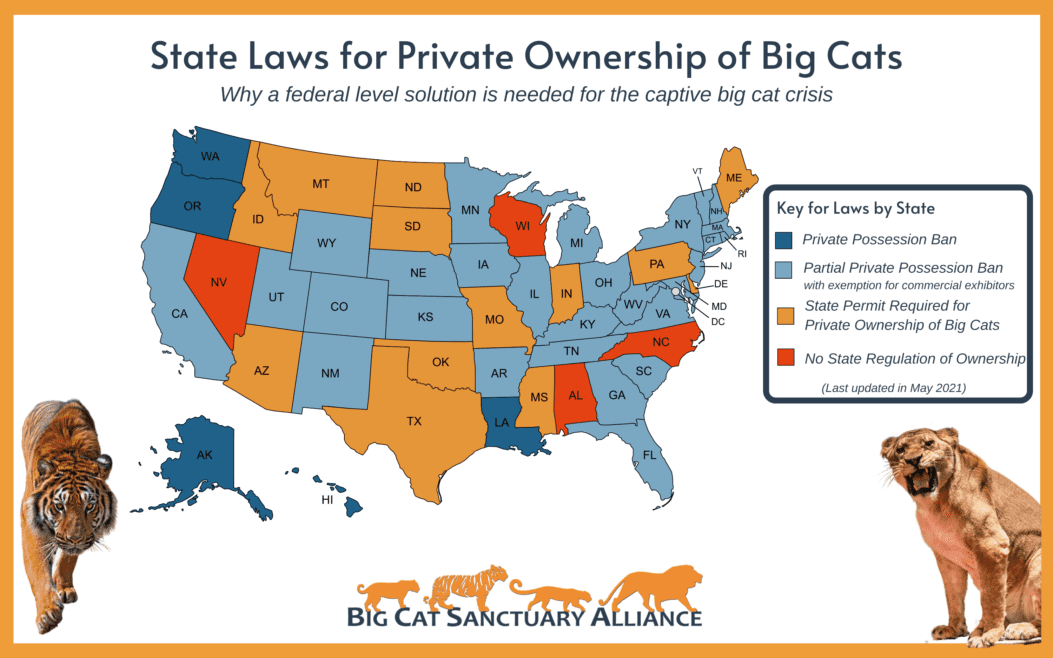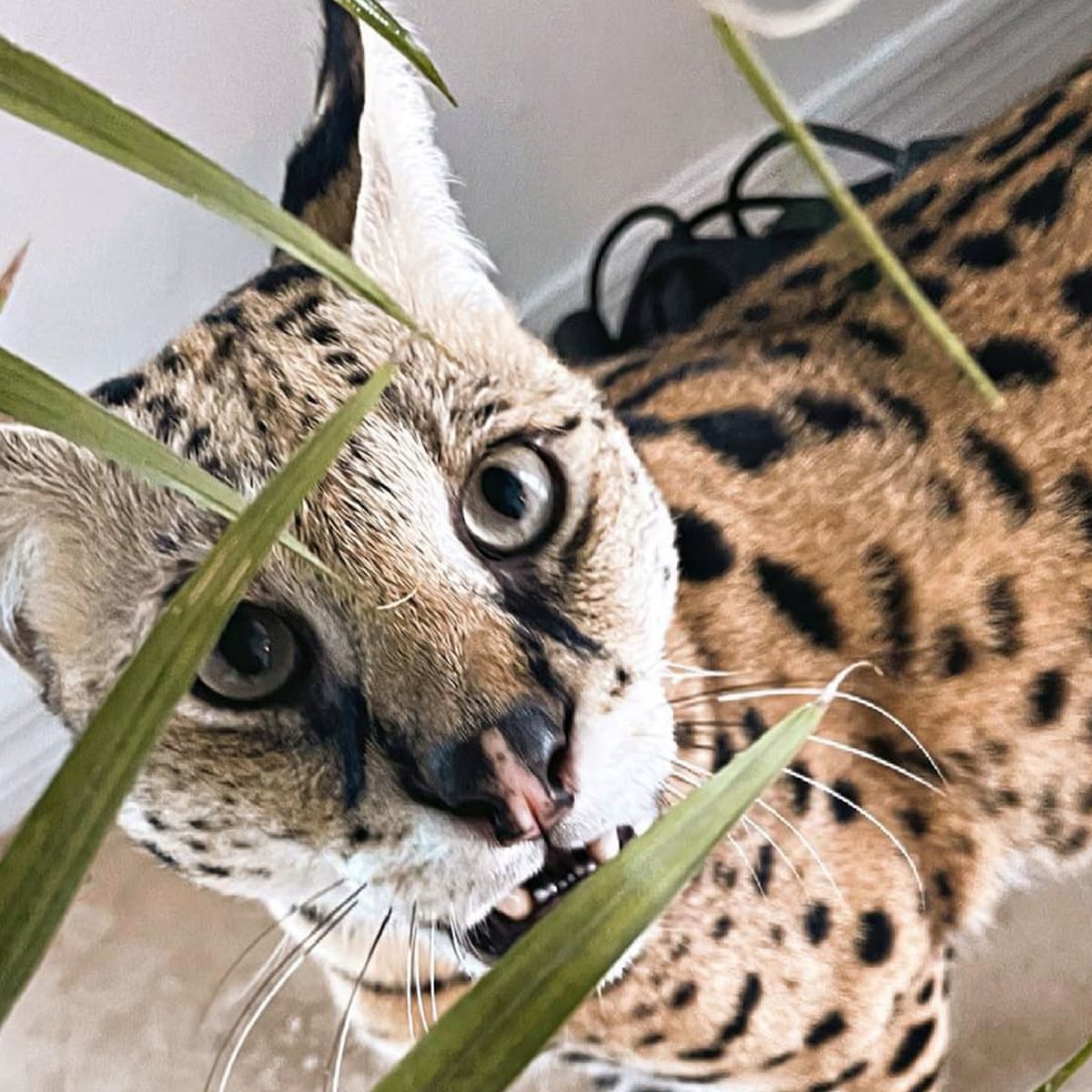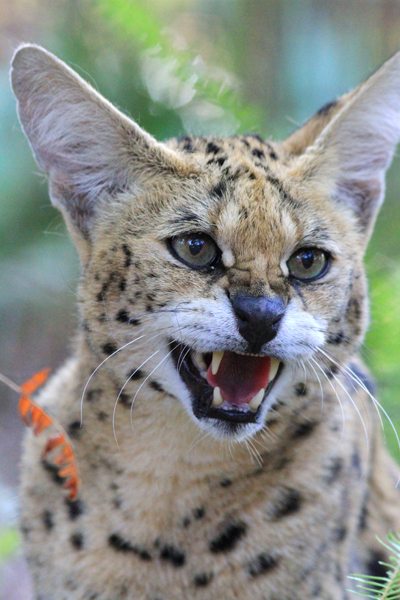Contents
- I. Introduction
- II. What are Savannah Cats?
- III. Fact 1: Temperament Similarities to Dogs
- IV. Fact 2: Trainability and Obedience
- V. Fact 3: Playfulness and Affection
- VI. Fact 4: Social Nature and Loyalty
- VII. Frequently Asked Questions
- 1. Are Savannah cats suitable for families with children?
- 2. Do Savannah cats require a lot of exercise?
- 3. Can Savannah cats be trained like dogs?
- 4. Do Savannah cats get along with other pets?
- 5. What kind of care do Savannah cats require?
- 6. Are Savannah cats legal as pets?
- 7. How big do Savannah cats grow?
- 8. Are Savannah cats hypoallergenic?
I. Introduction

Savannah cats are known for their unique characteristics and behavior, which often resemble those of dogs rather than typical domestic cats. This fascinating hybrid breed has gained popularity among pet owners who desire the loyalty and companionship of a dog combined with the elegance and grace of a cat. In this article, we will explore four facts that demonstrate how Savannah cats exhibit dog-like traits.
Their Playful Nature
One of the most striking resemblances between Savannah cats and dogs is their playful nature. These feline companions are known to engage in interactive play with their owners, just like dogs do. They enjoy games of fetch, tag, and chase, exhibiting agility and enthusiasm that is reminiscent of their canine counterparts.
Social Bonding and Trainability
Unlike many other cat breeds that are more independent, Savannah cats have a strong desire to bond with their human companions. They are highly social animals that crave attention and interaction. This sociability and friendly nature make them more receptive to training, just like dogs. Savannah cats can be taught various commands, tricks, and even to walk on a leash, which is a testament to their intelligence and trainability.
Strong Attachment to Their Owners
Savannah cats form deep attachments to their owners, displaying a level of loyalty and devotion usually associated with dogs. They enjoy being close to their human family members, often following them around the house and seeking out their company. This strong bond allows for a more interactive and rewarding relationship between the owner and their feline companion.
Active and Energetic Lifestyle
Savannah cats have an innate need for physical activity and mental stimulation, much like dogs. They thrive in environments where they have ample space to explore and engage in play. These cats are known for their jumping ability, often leaping to impressive heights. Their high energy levels make them great candidates for agility training, as they love to overcome obstacles and participate in challenging activities.
II. What are Savannah Cats?

Savannah cats are a unique and fascinating breed of domestic feline that have gained popularity in recent years. Known for their striking appearance and dog-like behaviors, these hybrid cats are a cross between a domestic cat and a serval, a wild African cat species.
Appearance
One of the most distinguishing features of Savannah cats is their size. They are typically larger than the average domestic cat, with males weighing between 12 to 25 pounds and females ranging from 8 to 15 pounds. Their long legs and sleek bodies give them a graceful and athletic appearance.
Another characteristic that sets Savannah cats apart is their coat. They have a short and dense coat with bold and distinct markings, resembling those of a serval. Common coat colors include silver, brown, and black, often with spots or stripes. Their striking appearance often turns heads wherever they go.
Temperament
Savannah cats are known for their high energy levels and adventurous nature. They are curious and playful, always on the lookout for new experiences and opportunities to explore. They enjoy interactive toys and puzzles that challenge their intelligence.
Unlike typical domestic cats, Savannah cats are often described as dog-like in their behavior. They are known to be loyal and form strong bonds with their owners. Many Savannah cats can be leash trained and enjoy going for walks, just like dogs. They are also known to be highly trainable, learning tricks and commands quickly.
Care and Maintenance
Keeping a Savannah cat as a pet requires special considerations. Their high energy levels mean they need plenty of mental and physical stimulation to prevent boredom and destructive behavior. Providing them with interactive toys, scratching posts, and engaging playtime is essential.
Another crucial aspect of caring for a Savannah cat is providing them with a spacious living environment. They thrive in homes with ample space for them to roam and climb. Additionally, providing them with vertical spaces such as cat trees or shelves can help satisfy their natural climbing instincts.
Regular veterinary check-ups, a balanced diet, and proper grooming are all vital for the well-being of Savannah cats. They have specific dietary needs, so it is essential to consult with a veterinarian to ensure they receive the appropriate nutrition.
Conclusion
Savannah cats are a captivating breed with their unique appearance and dog-like behaviors. They require dedicated care and attention but can make wonderful companions for those who are willing to meet their needs. If you’re looking for a feline friend that stands out from the crowd, a Savannah cat might be the perfect choice for you.
III. Fact 1: Temperament Similarities to Dogs

Savannah cats are known for their unique personality traits that often resemble those of dogs. Here are some fascinating facts about their temperament:
1. Sociability and Playfulness
Similar to dogs, Savannah cats are highly sociable and playful creatures. They enjoy interacting with their owners, and some even love to play fetch. Whether it’s chasing a toy or exploring their surroundings, these cats are always up for some fun.
2. Trainability and Obedience
Just like dogs, Savannah cats can be trained to follow commands and even learn tricks. With patient and consistent training, these cats can walk on a leash, sit, stay, and come when called. Their intelligence and willingness to please make them excellent candidates for obedience training.
3. Loyalty and Affection
Savannah cats form strong bonds with their owners and exhibit loyalty and affection towards them. They enjoy being in their human’s presence and may even greet them at the door. These cats are known to follow their owners around the house, seeking companionship and showing their love through cuddles and head bumps.
4. Energetic and Adventurous Nature
Another similarity between Savannah cats and dogs is their high energy levels and adventurous nature. These cats love to explore their environment and require plenty of mental and physical stimulation. They enjoy interactive play and require regular exercise to keep them happy and healthy.
5. Social Hierarchy and Pack Mentality
Savannah cats, like dogs, have a strong social hierarchy within their household. They often establish a pack mentality and may show dominance or submission behaviors. Understanding their social dynamics can help owners create a harmonious environment and maintain a healthy relationship with their feline companions.
IV. Fact 2: Trainability and Obedience

When it comes to trainability and obedience, Savannah cats truly stand out from the crowd. These exotic felines possess a remarkable ability to learn and follow commands, much like their canine counterparts. Whether you want them to sit, stay, or even fetch, Savannah cats can be trained to perform a variety of tasks.
The Intelligence of Savannah Cats
Savannah cats are known for their high intelligence. They have a keen ability to understand and respond to human cues, making them highly trainable. Their inquisitive nature and quick learning skills make training sessions a breeze. With consistency and positive reinforcement, these cats can quickly grasp new commands and tricks.
The Importance of Early Socialization
Early socialization plays a crucial role in shaping the trainability and obedience of Savannah cats. Exposing them to various environments, people, and other animals from a young age helps them develop confidence and adaptability. By providing positive experiences during their formative years, you can set a solid foundation for their training and ensure they grow up to be well-behaved companions.
Bonding and Positive Reinforcement
Savannah cats thrive on positive reinforcement and bonding with their owners. They form strong attachments and are highly motivated to please. Using rewards such as treats, praise, and playtime can be highly effective in reinforcing desired behaviors and building a strong bond with your Savannah cat. This positive approach to training helps create a harmonious relationship based on trust and mutual respect.
Consistency and Patience
Consistency and patience are key when training a Savannah cat. These intelligent felines require regular training sessions to reinforce commands and maintain their obedience. It’s important to be patient and understanding, as each cat may learn at their own pace. By allowing sufficient time for them to grasp new concepts and offering gentle guidance, you can achieve remarkable results in their trainability.
Professional Training for Complex Tasks
For more complex tasks or specialized training, seeking the help of a professional cat trainer can be beneficial. These experts have the knowledge and experience to guide you in training your Savannah cat for specific tasks or behaviors. From agility training to therapy work, professional trainers can help you unlock the full potential of your Savannah cat’s trainability.
V. Fact 3: Playfulness and Affection

One of the remarkable traits that make Savannah cats act like dogs is their playfulness and affectionate nature. These feline companions are known for their lively and entertaining behavior, often bringing joy and laughter to their owners.
The Love for Play
Savannah cats possess a natural inclination to play, just like their canine counterparts. They enjoy interactive games, toys, and activities that stimulate their curiosity and intelligence. Whether it’s chasing after a feather wand or pouncing on a ball, these cats exhibit a playful energy that can rival that of dogs.
Bonding and Affection
While cats are generally perceived as independent creatures, Savannah cats defy this stereotype by forming strong bonds with their human companions. They crave love and attention, seeking out affectionate moments with their owners. They often display their affection by rubbing against their owners, purring, and even curling up on their laps for a cozy cuddle session.
Social Interaction
Unlike many other cat breeds, Savannah cats are highly social animals. They thrive in the company of humans and other pets, including dogs. Their sociable nature allows them to adapt well to multi-pet households and ensures that they actively participate in family activities. You can expect your Savannah cat to always be present, ready to join in on the fun and interact with everyone around.
The Dog-Like Playfulness
What truly sets Savannah cats apart is their dog-like playfulness. They are known to play fetch, respond to commands, and even walk on a leash. This unique characteristic stems from their wild ancestry, as Savannah cats are descendants of the serval, a wild African cat known for its playful nature. Their innate curiosity and intelligence make them quick learners, allowing them to pick up dog-like behaviors with ease.
VI. Fact 4: Social Nature and Loyalty
Savannah cats are known for their social nature and loyalty, which sets them apart from other domestic cats. These unique traits make them more like dogs in terms of their behavior and interaction with humans.
Sociable and Friendly Towards Humans
Unlike many other cat breeds that are often described as aloof or independent, Savannah cats are highly sociable and friendly towards humans. They enjoy spending time with their owners, and they often seek out human companionship and attention.
These cats form strong bonds with their owners and can become quite attached to them. They will often follow their owners around the house and want to be involved in their daily activities. This loyalty and affectionate behavior make them similar to dogs, who are known for their devotion to their owners.
Playful and Energetic
Savannah cats are known for their high energy levels and playful nature. They love to engage in interactive play, whether it’s chasing toys, playing fetch, or even learning tricks. This playfulness makes them highly entertaining and enjoyable to have as pets.
Their energetic nature also means that they require plenty of mental and physical stimulation. Owners of Savannah cats often need to provide them with toys, puzzle games, and opportunities for exercise to keep them happy and fulfilled.
Ability to Form Social Bonds with Other Animals
In addition to their social nature towards humans, Savannah cats can also form social bonds with other animals, including dogs. With proper introduction and socialization, they can learn to coexist and even form friendships with other pets in the household.
This ability to get along with other animals is another characteristic that sets them apart from many other domestic cat breeds. It makes them a great choice for households that already have dogs or other pets.
Communication and Vocalization
Savannah cats are not only social in their behavior, but they are also vocal in their communication with humans. They use a variety of vocalizations to express their needs, desires, and emotions. These vocalizations can include purring, chirping, hissing, and meowing.
Owners of Savannah cats often find their vocalizations quite endearing and entertaining. It adds to their unique personality and further emphasizes their resemblance to dogs, who also use vocal cues to communicate with their owners.
VII. Frequently Asked Questions
1. Are Savannah cats suitable for families with children?
Yes, Savannah cats can be great pets for families with children. They are known to be social and interactive, and they often form strong bonds with their human family members. However, it’s important to supervise interactions between young children and cats to ensure the safety of both parties.
2. Do Savannah cats require a lot of exercise?
Yes, Savannah cats are highly active and energetic animals. They have a natural instinct to jump, climb, and explore their surroundings. Regular exercise and mental stimulation are essential to keep them happy and healthy. Providing interactive toys, scratching posts, and ample space for them to roam and play is recommended.
3. Can Savannah cats be trained like dogs?
Yes, Savannah cats are known for their intelligence and trainability. They can learn to walk on a leash, perform tricks, and even play fetch. Positive reinforcement methods, such as using treats or praise, can be effective in training them. However, it’s important to remember that each cat is unique, and training results may vary.
4. Do Savannah cats get along with other pets?
Savannah cats can get along well with other pets if properly introduced and socialized from a young age. However, their high prey drive and territorial nature may make them less compatible with small animals, such as rodents or birds. It’s important to supervise interactions and provide separate spaces if needed.
5. What kind of care do Savannah cats require?
Savannah cats require regular grooming, including brushing their coat to remove loose hair and keeping their nails trimmed. They also need a balanced diet that meets their nutritional needs. Regular veterinary check-ups, vaccinations, and parasite prevention are essential for their overall health and well-being.
6. Are Savannah cats legal as pets?
The legality of owning a Savannah cat as a pet varies depending on the location. In some places, there may be restrictions or specific permits required due to their hybrid nature. It’s important to research and comply with local laws and regulations before bringing a Savannah cat into your home.
7. How big do Savannah cats grow?
Savannah cats are known for their large size compared to domestic cats. They can range from about 12 to 25 pounds in weight, with some exceptional individuals growing even larger. The size of a Savannah cat can also depend on the generation of its hybrid lineage.
8. Are Savannah cats hypoallergenic?
No, Savannah cats are not considered hypoallergenic. They do produce allergenic proteins, like other cat breeds. However, some individuals with allergies may have a reduced reaction to Savannah cats compared to other breeds. It’s always recommended to spend time with a cat before bringing them into your home if you have allergies.

Jackson is an accomplished content writer with a flair for captivating storytelling. With a Bachelor’s degree in English Literature from the prestigious University of California, Berkeley, Hunter’s educational background has honed his writing skills to perfection. His love for felines is evident in his extensive knowledge of cat behavior and care, making him an expert in the field. Hunter’s passion for cats has led him to contribute insightful articles to various online platforms, providing valuable information and tips to cat owners worldwide. With his exceptional writing abilities and deep understanding of cats, Hunter continues to create engaging content that resonates with readers and leaves a lasting impact.
